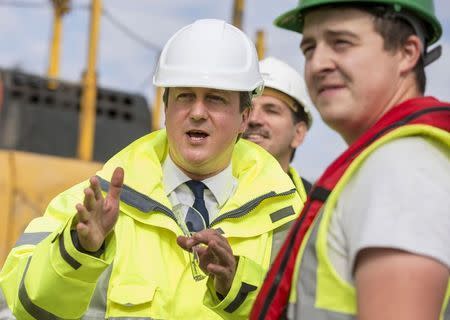Analysis - Deficit challenge looms for UK parties before election
By William Schomberg and William James
LONDON (Reuters) - Prime Minister David Cameron's announcement of tax cuts has exhilarated his Conservative Party, but the sobering question of who can be trusted with Britain's public finances remains the key to next year's national election.
The upbeat message from Cameron on Wednesday has added to questions about the credibility of finance minister George Osborne's plan to wipe out the budget deficit by 2020.
The Labour party, the centre-left opposition, has sent out its own mixed messages. Its would-be finance minister, Ed Balls, was booed by some party members last week when he called for spending cuts. Party leader Ed Miliband forgot to mention the deficit at all in a keynote speech.
Britain was saddled with a huge public-sector budget deficit after revenues from the country's banks and booming property prices plunged during the financial crisis.
Osborne has almost halved the shortfall since the Conservatives ousted Labour from power in 2010. But it still stands at nearly 100 billion pounds, about 6 percent of economic output, far higher than Osborne's original plan.
Both the Conservatives and Labour promise to tackle the shortfall if they win the election in May. But their ideas on how to do it provide voters with distinct choices on the degree of austerity.
Osborne wants to wipe out the deficit entirely before the end of the next parliament in 2020, requiring more than 20 billion pounds of spending cuts on top of those already announced. They will include a lot more savings in welfare beyond a two-year freeze on benefits he announced this week.
Balls, who wants to take Osborne's job next May, has a less challenging target of getting rid of the deficit in terms of day-to-day spending. That would give him room to borrow to meet investment promises, such as a big jump in home-building.
The Conservatives have ruled out tax increases. Labour plans new taxes on expensive homes and tobacco companies.
Osborne and Balls publicly deride one another over their different approaches.
"This, I think, is actually the biggest clear difference between the fiscal policies of the major parties that I remember for quite a long time," said Paul Johnson, director of the Institute for Fiscal Studies, a think tank.
The IFS recently estimated that the difference between the two plans is equivalent to an extra 28 billion pounds of spending a year under Labour, a figure seized upon by the Conservatives to portray Labour as a tax-and-spend party.
But the announcement by Cameron of tax cuts that would cost more than 7 billion pounds a year by 2020 is straining the Conservatives' image as prudent guardians of public finances.
BIG BLACK HOLE
"There is a big black hole in the Conservatives' spending plans. They have to make significant cuts and they haven't told us what they'd do," said Jonathan Portes, director of the National Institute of Economic and Social Research, an independent research body.
Government officials say they will give details of further savings between now and the election. They stress that the tax cuts promised by Cameron would depend on progress in meeting the target to eliminate the budget deficit in the next parliament.
Making that progress will be tough. It will require more cuts in areas that have already tightened their belts, such as transport and police, after the government said health and pensions will continue to be protected from cuts.
The freeze in benefits announced this week represented only a quarter of the 12 billion pounds of annual welfare savings that Osborne has said he plans to make.
"The memo on the desk of the next chancellor of the exchequer ... is going to be the same whichever party wins the election, which is: 'You've half of the job on the deficit to do, and the bad news is the last chancellor took all the low-hanging fruit'," said John Cridland, head of the Confederation of British Industry.
Balls dismisses suggestions that he would be prevented from making the necessary savings by opposition within Labour.
"If people think that I will flinch from those hard decisions then of course they won't trust us on the deficit," he said. "But I think we can show that we will balance the books."
Osborne for his part is gambling that voters will accept the need for the kind of austerity he is calling for, even if the promised tax cuts are likely to be years away.
"The public respect a political party that tells them the truth, has an economic plan and that is engaged in the challenges of the future," he told party activists this week.
Opinion polls give Labour a small but stubborn lead in voting intentions. However, the Conservatives have a much stronger rating on their ability to run the economy, which might be a key advantage going into the election on May 7.
But the prospect of further austerity has yet to dawn on many people in Britain, according to some pollsters.
"The difficulty now is that the public don't understand the economic situation of the UK and they think that the cuts have already been done," said Katharine Peacock, managing director of polling firm ComRes.
"The realisation that there is more on the way is going to come as quite a shock."
(Writing by William Schomberg; Editing by Larry King)




